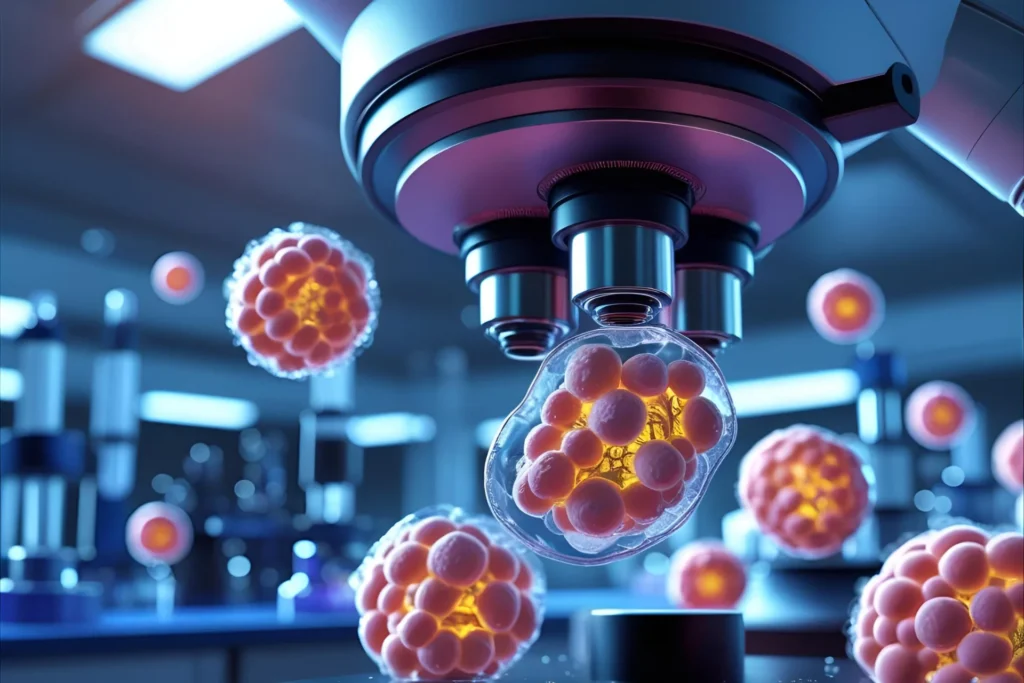Mesenchymal Stem Cell Derived Exosomes – A Next-Gen Cell-Free Therapy
Mesenchymal stem cell (MSC)-derived exosomes are nanosized extracellular vesicles (EVs) naturally secreted by MSCs. These tiny, membrane-bound particles play a vital role in paracrine signaling, acting as messengers that deliver bioactive molecules such as microRNAs (miRNAs), proteins, lipids, and cytokines to target cells. Rather than functioning through direct cell integration like traditional stem cell therapies, MSC-derived exosomes exert therapeutic effects by modulating inflammation, promoting tissue repair, and regulating immune responses making them a promising approach in cell-free MSC therapy. Their ability to mimic many of the regenerative properties of MSCs, without the risks associated with whole-cell transplantation, is positioning them at the forefront of next-generation regenerative medicine.

Composition and Function of MSC Exosomes
Mesenchymal stem cell (MSC)-derived exosomes are defined by specific surface markers most notably CD9, CD63, and CD81 which are used to identify and isolate them from other types of extracellular vesicles. These membrane proteins also play a functional role in exosome formation, cellular communication, and uptake by recipient cells.
Beyond their surface characteristics, MSC exosomes are loaded with a diverse set of bioactive cargo, including exosomal microRNAs (miRNAs) that regulate gene expression and influence cell behavior. Additionally, they carry a wide array of cytokines and growth factors such as TGF-β (involved in tissue remodeling), VEGF (which promotes blood vessel formation), and IL-10 (a key player in suppressing inflammation).
Functionally, these exosomes contribute to tissue repair by stimulating angiogenesis and cellular regeneration, while also reducing fibrosis. They exert strong immunomodulatory effects, helping to regulate immune responses in both local and systemic environments. Furthermore, their inherent anti-inflammatory properties make them particularly promising in the treatment of chronic inflammatory diseases, where balancing the immune system is critical for recovery.
Isolation and Characterization Techniques
Efficient and standardized isolation of MSC-derived exosomes is essential for downstream therapeutic use. Several methods are commonly employed to isolate, quantify, and validate exosomes, each with unique advantages and limitations. Consistency and purity are especially critical when preparing exosomes for clinical-grade applications, as impurities can affect both safety and function.
Ultracentrifugation
Ultracentrifugation remains the gold standard for exosome isolation. It separates particles based on size and density through a series of high-speed spins, allowing for relatively pure yields. However, this method requires advanced equipment and is labor-intensive, making it less suitable for large-scale processing.
ExoQuick™ precipitation
ExoQuick™ precipitation offers a more convenient alternative using polymer-based reagents to pull down exosomes from biological fluids. While this method is faster and more scalable, it can co-isolate unwanted particles, potentially affecting purity.
Nanoparticle Tracking Analysis (NTA)
Nanoparticle Tracking Analysis (NTA) is widely used to measure particle size and concentration. It allows real-time tracking of exosomes in suspension, making it ideal for assessing batch consistency and quality control in research and preclinical studies.
Transmission Electron Microscopy (TEM)
Transmission Electron Microscopy (TEM) provides visual confirmation of exosome morphology and size at high resolution. It is particularly useful for verifying the round, bilayered structure typical of extracellular vesicles.
qNano
qNano technology uses tunable resistive pulse sensing to deliver precise size distribution and particle concentration data. This technique is highly sensitive and valuable for validating exosome preparations in both research and manufacturing settings.
Overall, combining these methods helps ensure the purity and reproducibility of MSC-derived exosomes—critical factors when developing them into reliable therapeutic products for regenerative medicine and immunomodulation.
Therapeutic Applications of MSC-Derived Exosomes
Mesenchymal stem cell-derived exosomes are gaining momentum as a powerful tool in regenerative and anti-inflammatory medicine. Their ability to deliver bioactive molecules and modulate immune responses makes them highly versatile across a range of disease models. Below are some of the most promising therapeutic applications.

Osteoarthritis
MSC-derived exosomes have demonstrated the ability to reduce joint inflammation, protect cartilage from degradation, and promote tissue regeneration. Their anti-inflammatory effects and stimulation of chondrocyte activity make them a non-invasive and potentially disease-modifying option for osteoarthritis treatment.
Alzheimer’s Disease
In neurodegenerative conditions like Alzheimer’s, MSC exosomes may help by delivering neuroprotective miRNAs and growth factors that support neuron survival, reduce neuroinflammation, and improve cognitive function. Their small size allows them to cross the blood-brain barrier, making them a promising candidate for central nervous system therapies.


Wound Healing
Exosomes derived from MSCs accelerate wound closure by promoting angiogenesis, reducing inflammation, and enhancing fibroblast migration. Their regenerative capacity supports tissue remodeling, making them especially useful in chronic wounds, diabetic ulcers, and burn injuries.
Autoimmune Diseases
Thanks to their potent immunomodulatory properties, MSC-derived exosomes are being explored in autoimmune conditions such as lupus, rheumatoid arthritis, and multiple sclerosis. By delivering anti-inflammatory cytokines like IL-10 and modulating T-cell activity, these exosomes help rebalance immune responses without suppressing the system entirely.

Across all these use cases, the therapeutic benefits of MSC exosomes are closely linked to their anti-inflammatory and immunomodulatory functions. As cell-free therapies, they offer a safer, more scalable alternative to traditional stem cell treatments, with lower risks of rejection or tumor formation.
Advantages Over Traditional Stem Cell Therapy
MSC-derived exosomes are rapidly gaining attention as a safer, more efficient alternative to whole-cell therapies. Their cell-free nature offers several practical and therapeutic advantages that make them ideal for modern regenerative medicine.
Key Benefits of MSC-Derived Exosomes:
Commercial Landscape and Research Tools
With the growing interest in MSC-derived exosomes for diagnostics and therapy, the commercial sector has rapidly expanded to support both clinical development and basic research. Several leading biotechnology companies are actively developing tools, kits, and scalable solutions to facilitate exosome research and production.
Exosome Diagnostics is one of the pioneers in the field, focusing on exosome-based liquid biopsy technologies for early disease detection, especially in cancer. Their innovations highlight the diagnostic potential of exosomes as biomarkers found in blood and other biofluids.
System Biosciences (SBI) offers a wide range of products for exosome research, including isolation kits, characterization tools, and engineered exosome platforms for targeted delivery. Their user-friendly solutions have become staples in academic and industrial labs alike.
Lonza Biologicals supports clinical-grade manufacturing by providing GMP-compliant reagents, scalable exosome production platforms, and quality control services. Their infrastructure helps bridge the gap between lab research and commercial therapeutic development.
In the research community, ExoCarta stands out as a valuable exosome database, cataloging proteins, lipids, and RNA molecules identified in exosomal studies. It serves as a reference point for researchers aiming to better understand exosome composition and function across different cell types.
